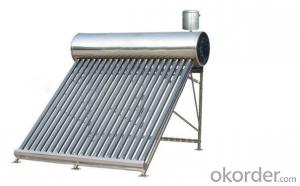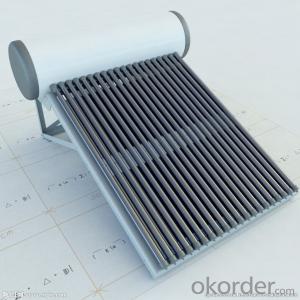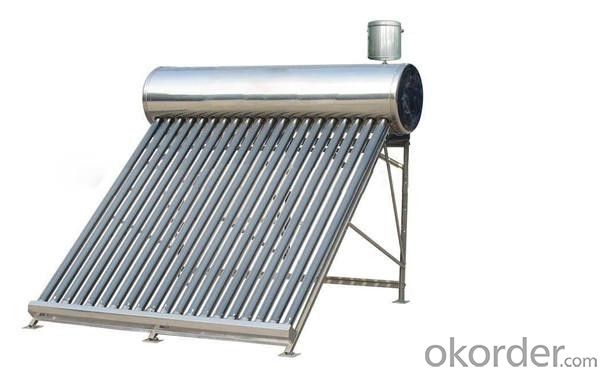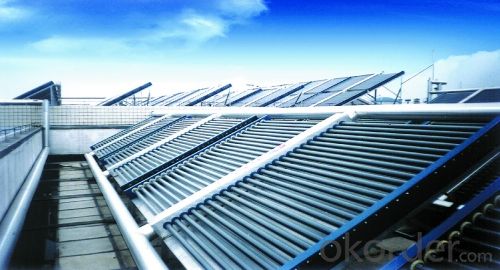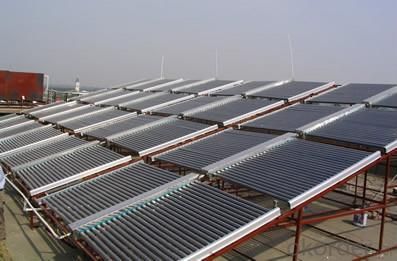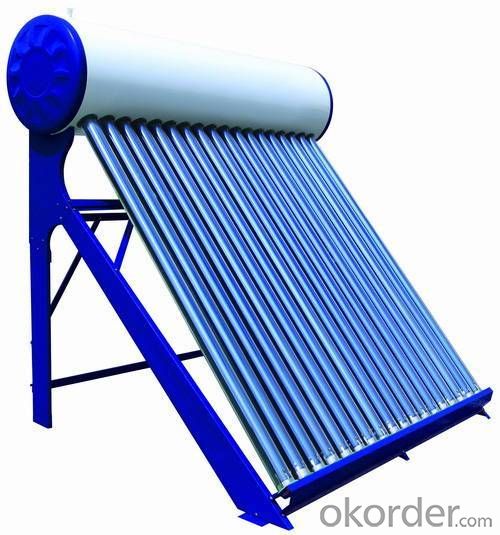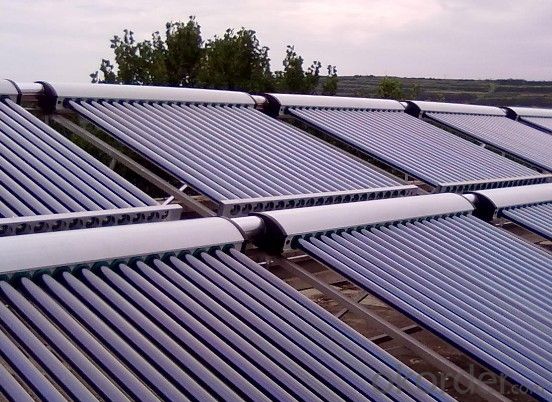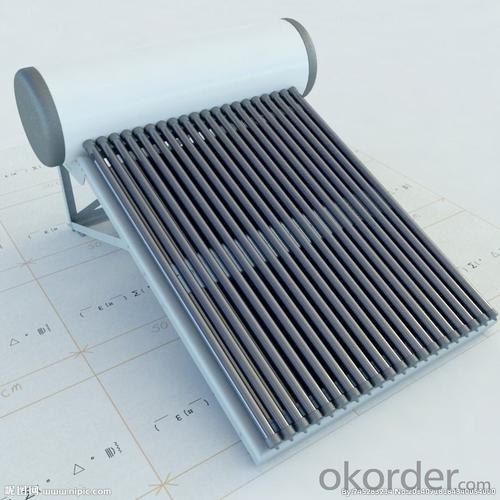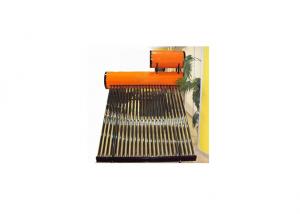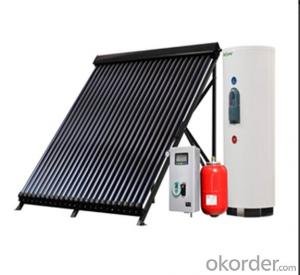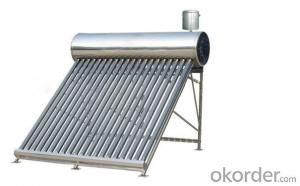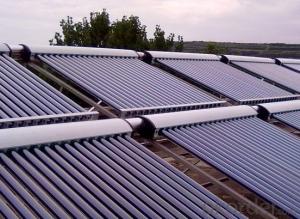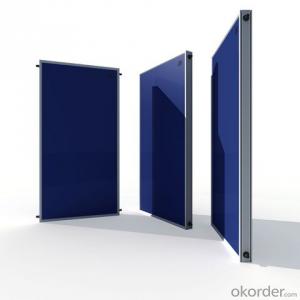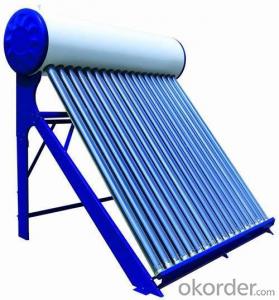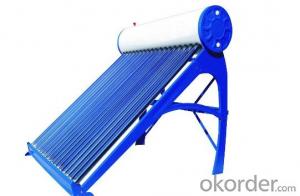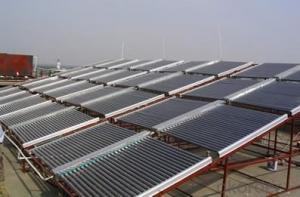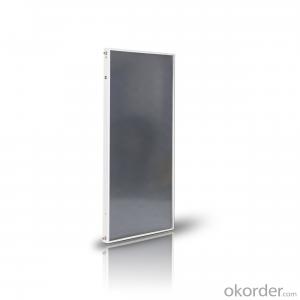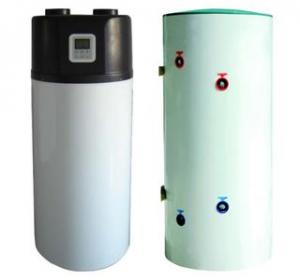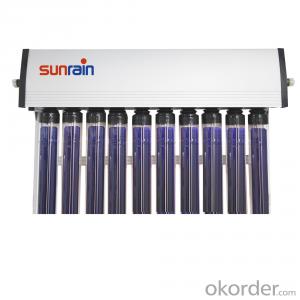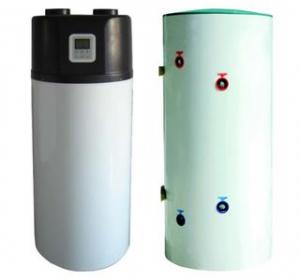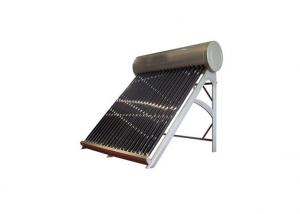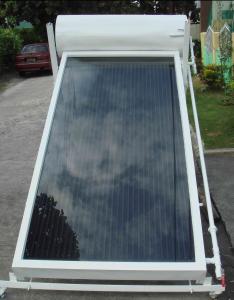Evacuated Tube Solar Water Heater - Freestanding Unpressurized Solar Hot Water System
- Loading Port:
- China main port
- Payment Terms:
- TT OR LC
- Min Order Qty:
- 10 set
- Supply Capability:
- 10000 set/month
OKorder Service Pledge
OKorder Financial Service
You Might Also Like
Introduction of Non-Pressure Solar Water Heater:
Non-pressure Solar Heater is one of the most economical solar water heating device with pretty high efficiency at the same time. It consists of hot water storage tank, solar vacuum tubes with mouth plug in storage tank, and bracket supporting tank and tubes.When cold water in evacuated tubes is heated with solar irradiation, as the specific gravities of hot water and cold water are different, hotter water goes upward to storage tank and colder water goes downward to glass tubes. through this continuous circulation, the cold water in storage tank will be gradually heated till sunset.
Solar water heaters working principle
1. The solar collector absorbs solar energy and transmits it to the solar water heater tank through circulation
2. When the temperature of the collector reaches the set value, the controller starts the circulation pump automatically
3. The circulation pump makes heat-conducting liquid circulate automatically
4. The heat-conducting liquid transfers heat to water by lower heat exchanger in the water tank.
5. When the temperature difference between solar collector and heat pipe solar water heaters tank doesn't reach the set value, the circulation pump will be shut automatically
6. In case the temperature of the water tank does not reach Tmax, Electric Heating Element will start to work automatically
Solar water heaters working station component:
1. Operating screen
2. Manometer
3. Pump speed adjust switches
4. Temperature difference circulation pump
5. Flow rate indicator
6. Return circuit connector
7. Safety valve
Solar water heaters specification:
Description | solar water heaters |
Material of out manifold | 0.55mm thickness color steel/ fluorine carbon steel |
Material of inner tank | Food grade 2.0 mm thickness SUS304 stainless steel |
Tank insulating layer | 40mm 45kg/m³ high-density polyurethane foamed |
Inlet and outlet hole | Male G1'' |
Max pressure | 0.6 Mpa |
Solar collector tube | 3.3 Borosilicate glass with N/Al coating |
Thickness of glass tube | 1.6mm |
Vacuum tube tightness | P≤0.005 Pa |
Absorption | as=0.93-0.96 (AM1.5) |
Emission ratio | εh=0.04-0.06 (80C±5C) |
Idle sunning property parameters | Y=220~260m2.C/KW |
Average heat loss coefficient | ULT=0.6~0.7W/(m2.C) |
Bracket: | 2.0mm thickness aluminum alloy |
Tank weight | 75KGS |
Tank size | 560mm Dia x 1810mm Height |
Tank capacity | 300L |
Solar collector | 2pcs 58x1800x15tube solar collector |
Absorber area | 2.811 m² |
Working station | SP116 working station |
Heat exchanger length | Upper:12m, Underside:18m |
Solar water heaters details show:
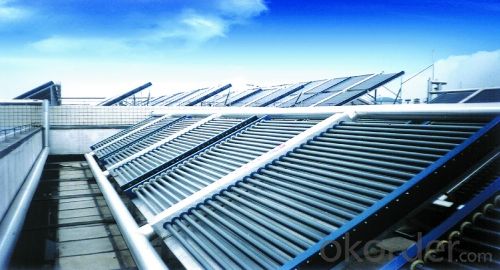
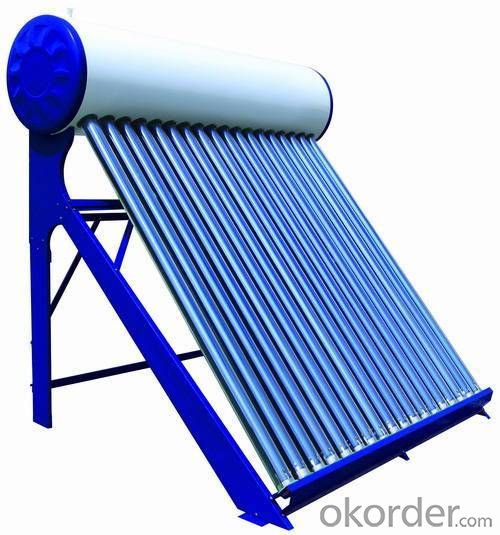
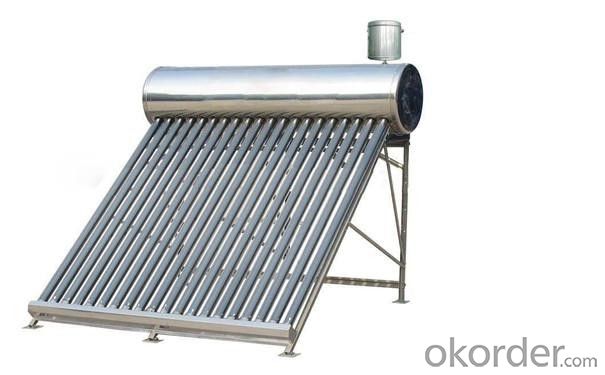
Benefits of this kind of solar water heaters:
1. Prolong the life of your existing water heater
2.Costs less than an electric, gas or oil water heater
3.No maintenance required
4.Lasts longer than a traditional hot water heater
5.Reduce your water heating costs
- Q: Can a solar water heater be used in areas with limited oil pipelines?
- Yes, a solar water heater can be used in areas with limited oil pipelines. Solar water heaters utilize energy from the sun to heat water, eliminating the need for oil-based heating systems. They are independent of oil pipelines, making them a suitable and sustainable alternative in such areas.
- Q: Can a solar water heater be used in areas with limited sewage infrastructure?
- Solar water heaters can be used in areas with limited sewage infrastructure, offering numerous benefits. Unlike traditional water heaters that rely on fossil fuels or electricity, solar water heaters utilize the sun's energy to heat water. They incorporate a solar collector that absorbs sunlight and converts it into heat, which is then transferred to the water. This remarkable process generates no waste and does not necessitate a connection to a sewage system. The utilization of solar water heaters in areas with limited sewage infrastructure proves highly advantageous. As they generate no waste, there is no requirement for a sewage system to manage the discharged water. Instead, the heated water can be directly employed for various purposes, such as bathing, cleaning, or even agricultural or industrial processes. This alleviates pressure on the limited sewage infrastructure, averting potential issues like overflow or contamination. Moreover, solar water heaters are typically designed to store and distribute hot water, ensuring a consistent supply even in regions with restricted access to electricity. This characteristic proves particularly valuable in remote or rural areas where electricity availability is unreliable or nonexistent. In summary, the use of solar water heaters in areas with limited sewage infrastructure presents a sustainable and economical solution for accessing hot water without burdening the sewage system further.
- Q: Can a solar water heater be used in areas with limited water quality?
- Yes, a solar water heater can be used in areas with limited water quality. However, it is important to note that the water quality may affect the performance and lifespan of the solar water heater. In areas with poor water quality, regular maintenance and cleaning of the system may be required to prevent mineral deposits or other contaminants from affecting its efficiency. Additionally, using water treatment methods such as filtration or water softening systems can help improve the water quality and minimize potential issues.
- Q: Can a solar water heater be used in areas with strict shade restrictions?
- No, a solar water heater cannot be effectively used in areas with strict shade restrictions as it requires direct sunlight to function efficiently. Shade restrictions limit the amount of sunlight reaching the solar panels, significantly reducing their ability to heat water.
- Q: Can a solar water heater be used in areas with high levels of air pollution from industrial sources?
- In areas with high levels of air pollution from industrial sources, a solar water heater can still be utilized. Although air pollution has the potential to diminish the efficiency of solar panels, it does not render them completely ineffective. The primary reliance of solar water heaters is on sunlight rather than air quality in order to generate heat. Consequently, these water heaters can continue to function and supply hot water even in polluted areas. However, it is important to acknowledge that the efficiency of the solar water heater may be marginally reduced as a result of the decreased amount of sunlight reaching the panels. Consequently, it may take a bit longer to heat the water or necessitate larger panels to compensate for the diminished efficiency. Nevertheless, a solar water heater remains a viable and sustainable option for hot water production in areas with significant air pollution levels.
- Q: How much maintenance does a solar water heater require?
- A solar water heater typically requires very little maintenance. Regularly inspecting and cleaning the system's glass panels and checking for any leaks or malfunctions is usually sufficient. Additionally, some models may require occasional checks and replacements of the system's fluid or parts, but overall, the maintenance needs are minimal compared to conventional water heaters.
- Q: Can a solar water heater be used in areas with high levels of air pollution?
- Yes, a solar water heater can still be used in areas with high levels of air pollution. While air pollution may affect the overall efficiency of the solar panels, the system can still function and generate heat from the sun. However, it is important to regularly clean and maintain the solar panels to ensure optimal performance in such areas.
- Q: Are there any government incentives for installing a solar water heater?
- Yes, there are government incentives for installing a solar water heater. These incentives vary by country and region, but they typically include tax credits, grants, rebates, or low-interest loans to help offset the cost of installation. Additionally, some governments may offer feed-in tariffs or net metering programs, allowing homeowners to earn credits or sell excess solar energy back to the grid. It is advisable to check with local government agencies or energy authorities to determine the specific incentives available in your area.
- Q: How long does it take to clean the solar water heater?
- Solar water heater should be how to maintain? The solar water heater at the roof, wind, sun and rain, in addition to the normal work of the installation quality, and also subjected to natural climate, long-term use of frequency are inseparable, if we neglect its quality and regular maintenance, some adverse factors will cause water pollution, to user health hazard. What factors will cause solar water heater water pollution?
- Q: Are there any specific insurance requirements for a home with a solar water heater?
- Yes, there may be specific insurance requirements for a home with a solar water heater. Homeowners insurance policies may have certain provisions or endorsements that address the coverage of solar water heaters, as they are considered an additional feature or improvement to the property. It is advisable to consult with your insurance provider to ensure that your policy adequately covers the solar water heater and any associated risks.
Send your message to us
Evacuated Tube Solar Water Heater - Freestanding Unpressurized Solar Hot Water System
- Loading Port:
- China main port
- Payment Terms:
- TT OR LC
- Min Order Qty:
- 10 set
- Supply Capability:
- 10000 set/month
OKorder Service Pledge
OKorder Financial Service
Similar products
Hot products
Hot Searches
Related keywords
